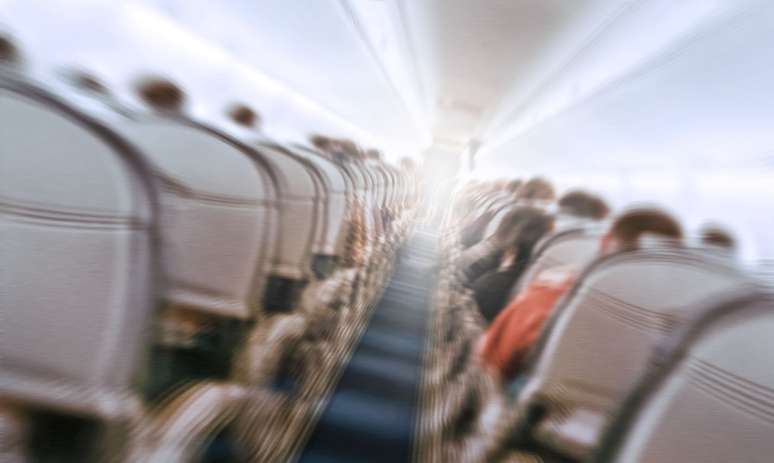Research shows that 65% of Brazilians have a fear of flying, a feeling that can be fought with some simple strategies
Fear is a common feeling among humanity. It can often keep us away from risky situations. The ideal, however, is that it does not hinder everyday life or the achievement of goals such as traveling, for example, which ends up happening to those who are afraid of flying.
According to the Real Time Big Data Institute, 65% of Brazilians are afraid of flying, and 51% are afraid after some traumatic experience. The good news is that 81% of those surveyed said they were afraid when traveling with their family.
“In fact, air travel can cause excitement and nervousness that are common in many people. The important thing is to distinguish normal anxiety from irrational fear, which is a phobia,” says Danielle H. Admoni, a psychiatrist and researcher.
According to psychologist Monica Machado, people who suffer from aerophobia (or aviophobia, fear of flying) often experience excessive sweating, nausea, difficulty breathing, tremors, increased heart rate, irritation, dizziness, among other physical and emotional manifestations.
“The ideal is to have psychological and/or psychiatric support to treat the phobia, since it is very difficult to get rid of it without professional help. However, if you are about to embark, there are ways to minimize these symptoms,” he says.
7 Strategies for a More Peaceful Travel
Experts offer some advice for those who are afraid of flying and still want to travel long distances. Watch:
Plan ahead
Choose a night flight, as you are more likely to sleep at your usual time. Three days before your trip, separate tickets, documents, passport (if applicable), money, cards, among other essentials. Keep everything together in one easy-to-remember place.
“As for packing, it’s best to do it the day before your trip, to make sure you pack everything you need. If you arrive too early and leave your bags packed a week in advance, you may find yourself agonizing over whether you forgot something,” says Monica.
Go ahead on your travel day
For domestic flights, arrive at the airport two hours early. For international flights, leave three hours early. As soon as you arrive, take care of all the paperwork and you’ll be free to enjoy the airport. “This way, your adrenaline levels are lower, which means less anxiety,” says Danielle Admoni.
Wear comfortable clothes
This is the time to focus on your comfort, not your vanity. Choose pieces that do not pinch or sting. On your feet, it would be ideal to wear very comfortable sneakers. Also remember to bring a coat with you, since the temperature inside the plane is always cold.
Work on your breathing
Depending on the level of anxiety, breathing becomes more shallow, with an increase in frequency and a decrease in depth. This changes the muscle tone of the respiratory chain, responsible for many of the body’s reactions to stress.
According to the psychologist, by practicing breathing correctly, it is possible to regulate the nervous system and reduce physical and emotional symptoms.
“One of the techniques is called square breathing, which requires a four-second pause on each breath and inhale. Inhale slowly through your nose for a count of four, pause for four seconds, exhale through your mouth for a count of four, and pause for another four seconds.”
Avoid self-medication
One of the biggest problems with taking anti-anxiety or sleep medications on your own is dosing errors. In addition to potentially causing intoxication, very high doses can make you so sleepy that you sleep the entire trip (or much of it).
On longer journeys, continuous sleep prevents the person from getting up and moving their legs, increasing the risk of deep vein thrombosis or even pulmonary embolism.
“Therefore, if you are going to take any medication, talk to your doctor first. He or she will prescribe the dose indicated for your condition, based on your age, weight, and the presence or absence of other pathologies,” emphasizes Danielle Admoni.
Avoid alcoholic beverages
According to the psychiatrist, when a person drinks, they feel relaxed, as their perception decreases. “However, being a central nervous system depressant, alcohol reduces the levels of serotonin in the brain, one of the neurotransmitters responsible for the sensation of pleasure and well-being. Therefore, drinking during a flight can worsen anxiety.”
In addition, the effect of alcohol is accentuated due to the altitude of the plane. This occurs due to the lower atmospheric pressure, resulting in less oxygen in the air.
“Precisely because there is less oxygen in the air, alcohol consumption can cause hypoxia, a set of symptoms such as malaise and dizziness. In other words, one more reason not to drink during a flight,” he says.
Have fun and interact
Listen to your favorite playlist, read a book, watch a movie or series, play a game on your phone. Any activity can distract you and make time pass faster. Also, an important tip is to interact with other people.
“Talk to your fellow passengers, take a tour of the plane, engage in conversation with the flight attendants, even to tell them about your fear. These professionals are trained and will quickly find ways to entertain you. The most important thing is to understand your effort to relieve anxiety and notice what works,” concludes psychologist Monica Machado.
Source: Terra
Ben Stock is a lifestyle journalist and author at Gossipify. He writes about topics such as health, wellness, travel, food and home decor. He provides practical advice and inspiration to improve well-being, keeps readers up to date with latest lifestyle news and trends, known for his engaging writing style, in-depth analysis and unique perspectives.







